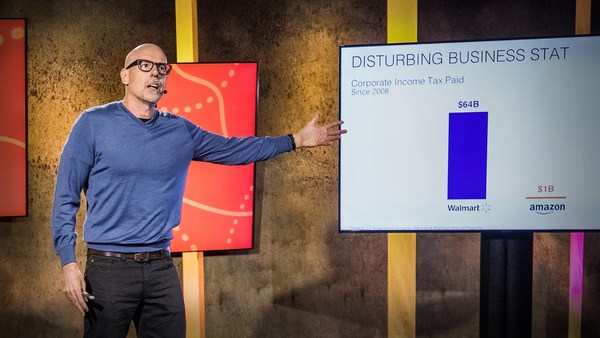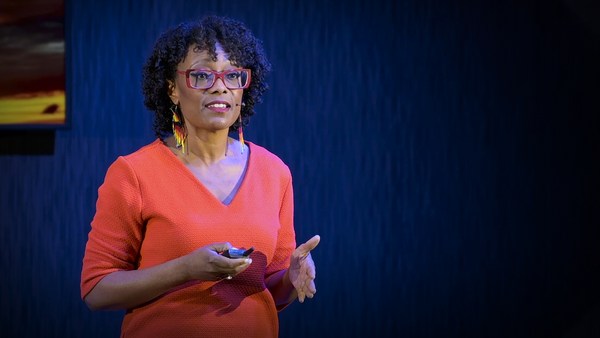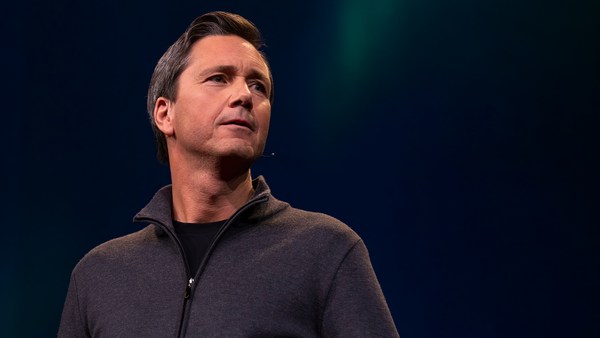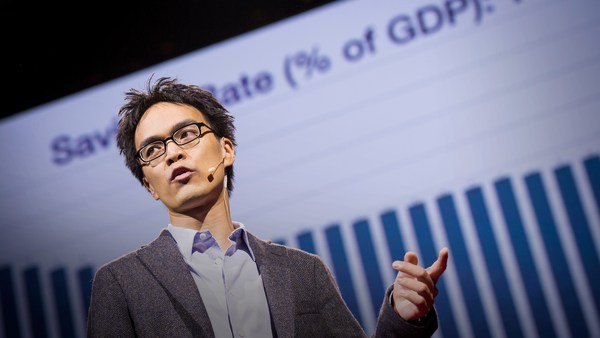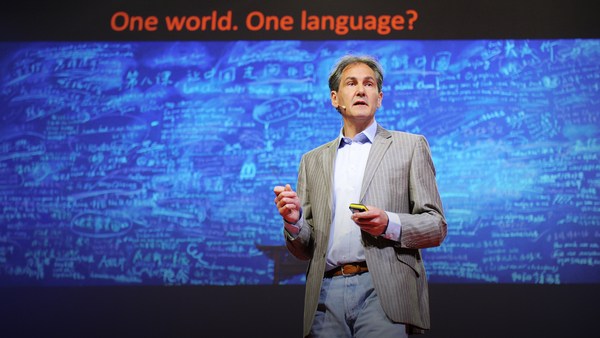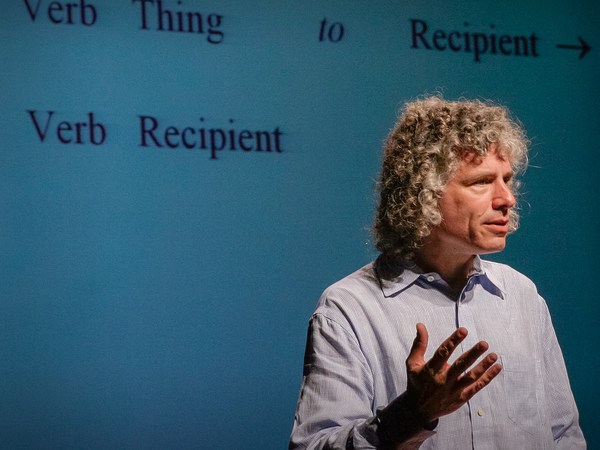My name is Scott Galloway, I teach at NYU, and I appreciate your time. I have 44 slides and 720 seconds. Let's light this candle.
(Laughter)
OK so for those of you who don't know me, I'm actually a global television store. True story. I've had four TV series in the last three years. Two of them have been canceled before they were launched, and two were canceled within six weeks. Let's recap.
(Video) If we want to juice this thing, if we want to put a cattle prod up the ass of the economy. Bloomberg. The most trusted name in financial news. Not for long.
Andrew Yang: I'm going to do whatever I can for this country of ours.
Scott Galloway: Jesus, come on, dude, you’re 0 for two.
(Video ends)
Face for podcasting. So first insight of the day. I'd like to be the first person to welcome you to the last TED.
(Laughter)
OK. By the way, it's clear -- what's it called? What are we here for? “The Brave and the Brilliant?” It's clear that Chris is a frustrated soap opera producer.
(Laughter)
Essentially what we have here is a telenovela where, after a night of unbridled passion between Bill Gates and Malcolm Gladwell, they give birth to their bastard love child, Simon Sinek.
(Laughter)
OK, I start us with a question. Do we love our children? Sounds like an illegitimate question, right? Well, I'm going to try and convince you otherwise.
Essentially, as we go down generations, we're seeing that for the last two generations, people are making less money on an inflation-adjusted basis. In addition, the cost of buying a home, the cost of pursuing education, continues to skyrocket. So the purchasing power, the prosperity, is inversely correlated to age. Simply put, as we get younger, we're taking away opportunity and prosperity from our youngest. The social contract that is now no longer in place and for the first time in the US's history, a 30-year-old is no longer doing as well as his or her parents were at 30. This is a breakdown in the fundamental agreement we have with any society, and it creates rage and shame.
(Applause)
As a result, people over the age of 55 feel pretty good about America, but less than one in five people under the age of 34 feel very good about America. This creates an incendiary. Righteous movements, cuts to our society end up becoming opportunistic infections because generally speaking, young people have a warranted envy, they're pissed off and they're angry that they don't enjoy the same spoils and prosperity that were provided to our generation.
A decent proxy for how much we value youth labor is minimum wage, and we've kept it purposely pretty low. If it had just kept pace with productivity, it'd be at about 23 bucks a share. But we've decided to purposely keep it low.
Out of reach. Median home price has skyrocketed relative to median household income. As a result, pre-pandemic, the average mortgage payment was 1,100 dollars, it's now 2,300 dollars because of an acceleration in interest rates and the fact that the average home has gone from 290,000 to 420. By the way, the most expensive homes in the world, based on this metric, are number three, Vancouver. Why? Because 60 percent of the cost of building a home goes to permits. Because guess what, the incumbents that own assets have weaponized government to make it very difficult for new entrants to ever get their own assets, thereby elevating their own net worth. This is the transfer I'm going to be speaking about.
(Applause)
This has resulted in an enormous transfer of wealth, where people over the age of 70 used to control 19 percent of household income, versus people under the age of 40, used to control 12. Their wealth has been cut in half. This isn't by accident, it's purposeful. This is me at UCLA in 1987. I know your first thought is I haven't changed a bit.
(Laughter)
This is also Mia Silverio, who is the analyst who put together these slides. By the way, Mia is 26. I did the math, just by virtue of her being in this audience, it brings the average age of the entire conference down 11 days.
(Laughter)
When I applied to UCLA, the admissions rate was 76 percent. Today, it's nine percent. I received a 2.23 GPA from UCLA. I learned nothing but how to make bongs out of household items and every line from "Planet of the Apes." And the greatest public school in the world, Berkeley, decided to let me in with a 2.27 GPA. And that's what higher ed is about. Higher ed is about taking unremarkable kids and giving them a shot at being remarkable.
(Applause)
And every year it's gotten more expensive. Higher ed and homes and the ability -- not only is higher ed incredibly expensive, it's not accessible. Because me and my colleagues are drunk on luxury, and I'll come back to that.
We've embraced the ultimate strategy. Me and my colleagues in higher ed wake up every morning and ask ourselves the same question when we look in the mirror. How can I increase my compensation while reducing my accountability?
(Laugter)
And we have found the ultimate strategy. It's called an LVMH strategy, where we artificially constrain supply to create aspiration and scarcity such that we can raise tuition faster than inflation. And old people and wealthy people have done the same thing with housing. All of a sudden, once you own a home, you become very concerned with traffic, and you make sure that there's no new housing permits.
And here is a memo to my colleagues in higher ed: we’re public servants, not fucking Chanel bags.
(Applause)
Harvard is the best example of this. They've increased their endowment in the last 40 years and have decided to expand their enrollment, their freshman class, by four percent. Any university that doesn't grow their freshman class faster than population that has over a billion dollars in endowment should lose their tax-free status because they're no longer in higher education. They're a hedge fund offering classes.
(Cheers and applause)
My first recommendation: Biden should take some of that 750 billion earmarked to bail out the one third of people that got to go to college on the backs of the two thirds that didn't and give a billion dollars to our 500 greatest public institutions, size-adjusted, in exchange for three things. One, they use technology and scale to reduce tuition by two percent a year, expand enrollments by six percent a year and increase the number of vocational certifications and nontraditional four-year degrees by 20 percent. Where does that get us? In just ten years, in just ten years, that doubles the freshman seats and cuts the cost in half. This isn't radical. This is called college in the '80s and '90s.
Another transfer of wealth. Look at what's happened to wages. Oh, they've gone up? Not as much as corporate profits. There's a healthy tension between capital and labor. But for the last 40 years, capital has been kicking the shit out of labor. Well, you think, what about wages, right? They've gone up. Well if you compare them to the S and P, they barely register. It's been an amazing time to own assets. But your attempt to get the certification or the income such that you can acquire assets has gotten harder and harder. In my class of 300 kids, it's never been easier to be a billionaire, it's never been harder to be a millionaire.
By the way, our job in higher ed isn't to identify a top one percent of people who are freakishly remarkable or have rich parents and turn them into a super class of billionaires. It's to give the bottom 90 a chance to be in the top ten.
(Applause)
You know who doesn't need me or higher education? The top 10 percent. The whole point of higher ed is to give the unremarkables, i.e. yours truly, who was raised by a single immigrant mother, a shot of being remarkable.
The transfer has been purposeful. While the cohorts, corporations and the ultra-wealthy continue to garner more and more of our wealth, we have decided, "I know, if they win the gold, let’s give them the silver and the bronze, and let’s lower their taxes.” This transfer is purposeful. It’s not by accident, and it works. Senior poverty is way down, and we should celebrate that. Meanwhile, child poverty is flat to up.
The third rail. I'm going to talk about Social Security. It would cost 11 billion dollars to expand the child tax credit. But that gets stripped out of the infrastructure bill. But the additional 135 billion dollars a year to Social Security, that flies right through Congress. And every year we transfer 1.4 trillion dollars from a cohort that is increasingly doing less well to the cohort that is the wealthiest cohort in the history of this planet. I'm not against Social Security, but the criteria should be if you need it, not whether you have a catheter. 80 percent of you, 80 percent of you have absolutely no reason to ever take Social Security. It is bankrupting our nation. And we have fallen under this mythology that somehow it's this great social program. No it's not. It's the great transfer of wealth from young to old.
(Applause)
How is this happening? Because our representatives are in fact, representative. Old people vote. Washington has become a cross between the "Land of the Dead" and "The Golden Girls."
(Laughter)
Quite frankly, this is fucking ridiculous. And if I sound ageist --
(Applause)
If I sound ageist, I am. And you know who else is ageist? Biology.
(Laughter)
When Speaker Pelosi had her first child, get this, two thirds of households didn't have color televisions, and Castro had just declared martial law. But she's supposed to understand the challenges of a 17-year-old girl who’s 5′ 9", 95 pounds, getting tips on dieting and extreme dieting from Facebook? She's supposed to understand the challenges that a 27-year-old single mother faces? By the way, young and dreamy.
(Laughter)
Young and dreamy.
(Applause)
The great intergenerational theft took place under the auspices of a virus. I know, let's use the greatest health crisis in a century to really speed-ball the transfer. This is the Nasdaq from 2008 to 2012. We let the markets crash. And by the way, you need churn, you need disruption because it seeds and recalibrates advantage and wealth from the incumbents to the entrants. It's a natural part of the cycle. But wait, lately, no, a million people dying would be bad. But what would be tragic is if we let the Nasdaq go down and guys like me lost wealth. So we pumped the economy, which again, increased the massive transfer of wealth. The best two years of my life? Covid -- more time with my kids, more time with Netflix, and the value of my stocks absolutely exploded. And who has to pay for my prosperity? Not me. Future generations who will have to deal with an unprecedented level of debt. Why am I here, and why do I get the prosperity I enjoy? Because in 2008 we bailed out the banks, but we didn't bail out the economy. We let the markets fall. So as I was coming into my prime income-earning years, I got to buy, no joke, these stocks at these prices. This is where those stocks are now. Where does a young person find disruption? When you bail out the baby boomer owner of a restaurant, all you're doing is robbing opportunity from the 26-year-old graduate of a culinary academy that wants her shot. We need disruption.
(Laughter)
I just like this slide. It has no context or relevance.
(Laughter and cheers)
We're economically attacking the young, but I know, let's attack their emotional and mental well-being. Let's take advantage of the flaws in our species with medieval institutions, Paleolithic instincts and godlike technology.
I'm just going to say, I think Mark Zuckerberg has done more damage to the young people in our nation while making more money than any person in history.
(Applause)
Oh, but wait, it could be worse. It's as if we let an adversary implant a neural jack into our youth to raise a generation of civic, military and business leaders that hate America. How can we be this stupid?
(Laughter)
This all adds up to a bunch of graphs all headed up into the right. And what are they? What's the first one? Oh, that's self-harm rates, which have exploded, especially among girls since my colleague Jonathan Haidt pointed out, it's really, really gone crazy since social went on mobile. What's the next one? Teens with depression. The next one, men and women not having sex. Biggest fear of my parents was that I was going to get in too much trouble. My biggest fear, honestly, is that my kids aren't going to get into enough trouble. My advice to every young person watching this program is go out, drink more and make a series of bad decisions that might pay off.
(Laughter and applause)
Next graph, cumulative gun deaths. You're more likely to be shot in the United States if you're a toddler or an infant than a cop. Next graph, obesity, way up. By the way, the industrial food complex wants to addict you to shitty, fatty foods so they can hand you over to the industrial diabetes complex. We should not romanticize obesity. You're not finding your fucking truth. You're finding diabetes.
(Laughter and applause)
Overdose deaths, way up. Deaths of despair. When I was in high school, it was drunk driving, now it's kids killing themselves. Young people don't want to have kids anymore. Two-thirds of people aged 30 to 34, able-bodied, used to decide to have at least one child. It's been cut in half. It's now less than a third, 27 percent. As a result, people over the age of 60 in the US, pretty happy. People under the age of 30, not so much. Some of the lowest in the free world.
What can we do? Nothing wrong with America that can't be fixed with what's right with it. We got the hard stuff figured out. There are programs to address all of these issues, they cost a lot of money, that's the hard part. And we have figured this out. In just five minutes post an earnings call, we can add a quarter of a trillion dollars to the economy. We've got the hard part figured out, the resources.
We have the money, but we decide not to do it. This is per-capita spending on child care in the United States relative to other nations. This is housing permits. Things are doable. We increase minimum wage at 25 bucks an hour, it goes into the economy. The wonderful things about low- and middle-income households is they spend all their money. We have to have or restore a progressive tax structure with alternative minimum tax on corporations and wealthy individuals. We need to refund the IRS. We need to reform Social Security. It should be based on whether you need the money, not on how old you are. We need a negative income tax. My friend Andrew Yang screwed up a great idea, but he branded it incorrectly. Instead of calling it UBI, he should’ve got Republicans on board by calling it a negative income tax.
(Laughter)
We need to eliminate the capital gains tax deduction. When did we decide that the money that capital earns is more noble than the money that sweat earns? Shouldn't it be flipped?
(Applause)
We need to remove 230 protection for all algorithmically-elevated content. We need identity verification. The reason we can have identity verification is because we have a First Amendment. Break up Big Tech. We have monopolies that are incurring greater and greater costs on every small business and parents because again, see above, our representatives don't understand these technologies. We need to age-gate social media. There's absolutely no reason anyone under the age of 16 should ever be on social media.
(Applause)
We need universal pre-K. We need to reinstate the expanded child-tax credit. We need term limits, see above, Andrew Yang. We need income-based affirmative action. Any visible signs of affirmative action make no sense at all. You would rather be born gay or non-white, in the United States today than poor. And that's a sign of our progress and our need to recalibrate who we give advantage to. Affirmative action, of which I’m a beneficiary -- I got Pell Grants, I got unfair advantage -- affirmative action is a wonderful thing, and it should be based on color: it should be based on green. How much money you have or don't have. Expand college enrollment in vocational programs. Mental health, ban phones in schools, invest in third places, Big Brothers and Sisters programs. We need national service. We need to tell people in the United States and Canada that they live in the greatest countries in the world, and we need to remind them of that every day by exposing them to other great Americans where they feel connective tissue.
We can do all of this. We can do all of it. We have the resources. The question is, do we have the will? This is my last slide. It is an emotionally manipulative slide to try and get you to like me more.
(Laughter)
But it does have a message. This is the whole shooting match. Anybody here without kids, ask someone with kids. You have your world of work, you have your world of friends, you have your world of kids. Something happens here, your whole world shrinks to this.
(Applause)
So I present, as I wrap here, with just a few questions. One, if you acknowledge that our kids are the most important thing in our lives, that everything else we do here is meaningful, but our kids' well-being and prosperity is profound. If you acknowledge that they're doing more poorly than previous generations. If you believe there’s a chance that the illusion of complexity has done nothing but provide cloud cover for the unbelievable transfer of good will, of well-being and of prosperity from young to old. And if you believe we can actually fix these problems and we have the resources, then I present to you, I posit, I augur the question that I hope has more veracity than it did 17 minutes and 24 seconds ago. And that's the following question. Do we love our children?
My name is Scott Galloway, I teach at NYU, and I appreciate your time.
(Cheers and applause)
Thank you.
(Applause)
